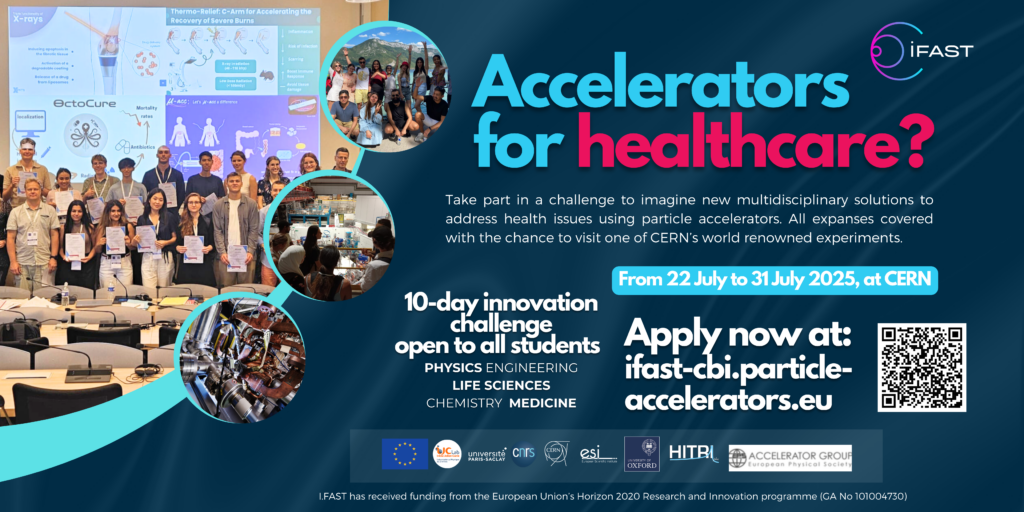A 10-day challenge for multidisciplinary teams of young people!
The 2025 I.FAST CBI will take place from Tuesday July 22nd to Thursday July 31st.
Come to take part in an EU-funded challenge to imagine new multidisciplinary solutions to address health issues by using particle accelerators. This challenge will be tackled by multidisciplinary teams invited to stay, all expenses covered, for 10 days at the European Scientific Institute (ESI) near Geneva.

Some particle accelerators such as the Large Hadron Collider (LHC) at CERN are the largest scientific tools on Earth. But beyond driving large scientific discoveries, many smaller accelerators are used in medicine to detect and/or treat cancer as well as having many other applications in our daily lives.
During 10 days, you will join in Archamps near Geneva, a team of selected students and young people from different academic backgrounds to imagine innovative solutions on “how can particle accelerators be used to improve human health?”. On the 10th day, you will present your work to a jury of experts at CERN.
To help in this task, you will be offered high-level seminars on particle accelerators and their applications, current challenges in the field of human health and on innovation and scientific communication. Mentors will be on hand to ensure a stimulating environment to discuss these issues.
This initiative is put forward by the I.FAST project, funded by the European Union’s Horizon 2020 research and innovation programme, together with several partners including CERN, ESI, CNRS, Oxford University, the Hitriplus project, the Accelerator Group of the European Physical Society, ESS…. It stems from the historic collaboration between the ESI, CERN and others partners to run the Joint Universities Accelerator School.
Who can apply?
Applications are welcome from students currently enrolled in their 3rd to 5th year of university (final year bachelor’s and master’s) studying physics, engineering, chemistry, life science and medicine.
Interest or experience in the fields of particle accelerators or medical technologies will be an advantage.
Language:
All activities will be held in English.
How to apply?
To apply fill the form at http://www.ifast-cbi.particle-accelerators.eu/application/
Application deadline:
The application form has to be submitted before Monday March 3rd 23:59, Geneva time.
Calendar:
March 3rd 2025: Application deadline
May 1st: Successful applicants are notified.
30th June: Online meeting at 5pm, “Getting to know each other”.
3rd-17th July: Series of online seminars at 5pm to learn about accelerators and their applications to human health.
Tuesday July 22nd to Thursday July 31st: Stay at the European Scientific Institute in Archamps (including visits at CERN).
Thursday July 31st: Presentation at CERN and award ceremony.
This project has received funding from the European Union’s Horizon 2020 Research and Innovation program under Grant Agreement No 101004730 and No 101008548.
Past CBI in the news:
Article on CERN’s website: Students pitch innovative ideas to tackle healthcare issues using particle accelerators in 10-day challenge (also on the I. FAST website).
Linkedin post with the results of the 2024 challenge.
Article published in Prima Pagina, the newsletter of the Italian Physical Society.
Article published by Ecotextile: Electron beams separate blended textiles.
Article published by the Textfash publication: Particle Accelerators Can Accelerate Circular Fashion by Segregating Fabric Components
Article published on the I.FAST website in August 2023 and on the CERN website.
Online seminar for the APS: « The I.FAST CBI: a challenge to engage students on the application of particle accelerators to the environment” by Dr. Nicolas Delerue
Article published in Accelerating News in December 2022.
Article published in CERN Bulletin in October 2022.
Article published in Accelerating News! in December 2021.
Recommended reading:
See our page with reading material about particle accelerators.
Questions?
Please check the Frequently Asked Questions page if you have any questions.
